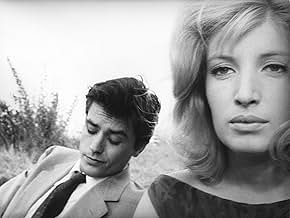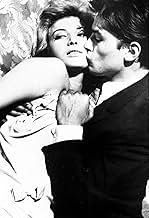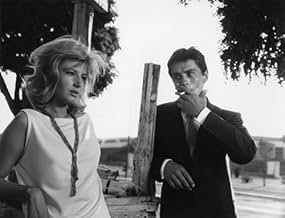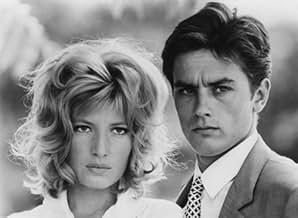IMDb रेटिंग
7.7/10
23 हज़ार
आपकी रेटिंग
अपनी भाषा में प्लॉट जोड़ेंA young woman meets a vital young man, but their love affair is doomed because of the man's materialistic nature.A young woman meets a vital young man, but their love affair is doomed because of the man's materialistic nature.A young woman meets a vital young man, but their love affair is doomed because of the man's materialistic nature.
- पुरस्कार
- 1 जीत और कुल 5 नामांकन
Cyrus Elias
- Intoxicated Man
- (बिना क्रेडिट के)
Alba Maiolini
- Woman at the Stock Market
- (बिना क्रेडिट के)
Maria Tedeschi
- Woman with Glasses at the Stock Market
- (बिना क्रेडिट के)
फ़ीचर्ड समीक्षाएं
Smart and moody, this film is not only about emotional Eclipse, it is about the eclipse of the old society as it changes, and also about how architectural changes eclipse older style, and more importantly, nature. There are really smart and insightful comments here on changing racial attitudes, and the disparities between rich, poor, and the people who don't mind cannibalizing the disenfranchised. All this commentary done with the subtlety of the slowing growing suburbs that our leading lady lives in.
Monica Vitti plays our "everywoman" who is our window into the Director's mind, but also herself a mere dot on the landscape. Early on, we see her throw away exactly what she seems to be looking for, only to pursue it in exactly the wrong place/person.
The film has a look of a sci-fi horror movie, but the horror here is emotional desolation, the destruction of nature/natural-ness, and the looming threat of nuclear war. This film, so cleanly represents the era when "duck and cover" was not only a physical act, it was an emotional state.
If you don't like film as art, you will be completely lost by the architectural city-scape ending montage, and the lack of traditional film closure. This is not a light evening of movie entertainment, but it is film making at it's non-verbal, eloquent best. Captivating, thought provoking, and meaty.
Monica Vitti plays our "everywoman" who is our window into the Director's mind, but also herself a mere dot on the landscape. Early on, we see her throw away exactly what she seems to be looking for, only to pursue it in exactly the wrong place/person.
The film has a look of a sci-fi horror movie, but the horror here is emotional desolation, the destruction of nature/natural-ness, and the looming threat of nuclear war. This film, so cleanly represents the era when "duck and cover" was not only a physical act, it was an emotional state.
If you don't like film as art, you will be completely lost by the architectural city-scape ending montage, and the lack of traditional film closure. This is not a light evening of movie entertainment, but it is film making at it's non-verbal, eloquent best. Captivating, thought provoking, and meaty.
L'Eclisse (1962) is a profoundly artistic, wonderfully crafted modern Italian film, in which the audience is permitted to draw their own conclusions about what they are seeing on the screen.
Unlike most directors, who construct their films in very specific, traditional ways to tell stories they wish to convey, in L'Eclisse the director Michelangelo Antonioni paints pictures which mean different things to different people. It's an open-ended story and the audience is allowed and actually encouraged to come up with their own theories about the main plot and sub-plots, the overall themes, and the characters' motivations and personalities. None of them are carved in stone. You yourself can travel to a very special, unique place by watching L'Eclisse, and it can be a very different journey than someone else's.
What do the white lines mean to you? They show up several times in compositional frames in the film: on the street, on the runway when the plane lands, outside a church, and in more abstract ways in signposts, in clothing, in architecture. Is an actual eclipse taking place when darkness descends and the street light suddenly goes on? or has nighttime simply fallen and we're left with a sense of desolation and obliteration of the modern city? has the city been hit by a nuclear bomb? The mushroom water tower: does it just signify the nuclear age, or is it a real omen for the future of mankind? Is it not also a phallic symbol, showcasing the director's idea that the stockbroker character is primarily interested in towering conquests, and that sexuality is an underlying motivation of the main female character's psyche, even though she also seems afraid of intimacy and commitment? The man riding the horse and buggy and the nursemaid pushing the baby buggy: do these things just mark the passage of time? or do they have a deeper meaning that represents the old world, a world that is quickly disappearing from the modern landscape? Is the final scene between the couple the end of their relationship, or are they about to become more serious? Questions like these can be answered in different ways, depending on your own perspective.
This was a novel approach to film-making in 1962, and actually it's also still novel today too! How many films dare to resemble L'Eclisse in the 21st century? Today films are too formulaic and rarely is the same creativity expressed that Michelangelo Antonioni achieved so sublimely in his film. If I was a filmmaker this would be the kind of film I would love to make, full of symbolism and repressed emotions.
The cinematography is exquisite in this film. The new Criterion double disc set did a fantastic job with the print and the extras. My suggestion would be to watch the film without commentary and then immediately afterward watch it again with the commentary on. As he talks you will find yourself noticing things you missed the first time around, and that the commentator is missing too! For instance, notice how in the scene when the ladies are chasing the dogs who have escaped the apartment, that Vittoria approaches two dogs, a white and a black one, and it's the black dog who gets up and dances and charms her, an analogy to the previous scene, in which Vittoria had put on black-face and did an African dance in her racist friend's apartment. The white dog blithely walks away, representing the stifling racist views of her friend Marta, and the black dog shows joy of movement and a fun nature, like Vittoria. The commentator completely misses this message.
Acting is superb by all three leads, Monica Vitti, with her finely chiseled face and wild blonde hair, Alain Delon, who conveys emotions easily with just the flick of an eyebrow, and Francisco Rabal, classically handsome and intense. Also of note is the actress who plays Vittoria's mother, Lila Brignone, who does a good job depicting the emotional distance the character feels from the estranged daughter, which in turn conveys to the audience one of the primary reasons Vittoria is afraid of intimacy: she never had a demonstrative relationship with her mother.
If you're a fan of Italian cinema, don't miss L'Eclisse. It's a special film which will stay with you long after you've seen it.
10 out of 10.
Unlike most directors, who construct their films in very specific, traditional ways to tell stories they wish to convey, in L'Eclisse the director Michelangelo Antonioni paints pictures which mean different things to different people. It's an open-ended story and the audience is allowed and actually encouraged to come up with their own theories about the main plot and sub-plots, the overall themes, and the characters' motivations and personalities. None of them are carved in stone. You yourself can travel to a very special, unique place by watching L'Eclisse, and it can be a very different journey than someone else's.
What do the white lines mean to you? They show up several times in compositional frames in the film: on the street, on the runway when the plane lands, outside a church, and in more abstract ways in signposts, in clothing, in architecture. Is an actual eclipse taking place when darkness descends and the street light suddenly goes on? or has nighttime simply fallen and we're left with a sense of desolation and obliteration of the modern city? has the city been hit by a nuclear bomb? The mushroom water tower: does it just signify the nuclear age, or is it a real omen for the future of mankind? Is it not also a phallic symbol, showcasing the director's idea that the stockbroker character is primarily interested in towering conquests, and that sexuality is an underlying motivation of the main female character's psyche, even though she also seems afraid of intimacy and commitment? The man riding the horse and buggy and the nursemaid pushing the baby buggy: do these things just mark the passage of time? or do they have a deeper meaning that represents the old world, a world that is quickly disappearing from the modern landscape? Is the final scene between the couple the end of their relationship, or are they about to become more serious? Questions like these can be answered in different ways, depending on your own perspective.
This was a novel approach to film-making in 1962, and actually it's also still novel today too! How many films dare to resemble L'Eclisse in the 21st century? Today films are too formulaic and rarely is the same creativity expressed that Michelangelo Antonioni achieved so sublimely in his film. If I was a filmmaker this would be the kind of film I would love to make, full of symbolism and repressed emotions.
The cinematography is exquisite in this film. The new Criterion double disc set did a fantastic job with the print and the extras. My suggestion would be to watch the film without commentary and then immediately afterward watch it again with the commentary on. As he talks you will find yourself noticing things you missed the first time around, and that the commentator is missing too! For instance, notice how in the scene when the ladies are chasing the dogs who have escaped the apartment, that Vittoria approaches two dogs, a white and a black one, and it's the black dog who gets up and dances and charms her, an analogy to the previous scene, in which Vittoria had put on black-face and did an African dance in her racist friend's apartment. The white dog blithely walks away, representing the stifling racist views of her friend Marta, and the black dog shows joy of movement and a fun nature, like Vittoria. The commentator completely misses this message.
Acting is superb by all three leads, Monica Vitti, with her finely chiseled face and wild blonde hair, Alain Delon, who conveys emotions easily with just the flick of an eyebrow, and Francisco Rabal, classically handsome and intense. Also of note is the actress who plays Vittoria's mother, Lila Brignone, who does a good job depicting the emotional distance the character feels from the estranged daughter, which in turn conveys to the audience one of the primary reasons Vittoria is afraid of intimacy: she never had a demonstrative relationship with her mother.
If you're a fan of Italian cinema, don't miss L'Eclisse. It's a special film which will stay with you long after you've seen it.
10 out of 10.
L'Eclisse (1962)***1/2
Third film in Antonioni's trilogy of alienation following L'Avventura (1960) and La Notte (1961) about a young woman (Monica Vitti) and her brief affair with handsome Alain Delon.
Like in his other movies, Antonioni uses specific techniques not to tell the story but rather to express the lack of communication among the characters, their alienation and incapableness to make a strong and meaningful relation. May this be because of their shallow characters or as a result of living in a modern society marked with the superficial values like prestigious and run-for-the-money it's up to the viewer to decide. Anyway, long cadres, real time events, visual metaphors and visual contrasts between the characters on the one side and landscapes and/or modern day creations like buildings, streets (usually empty) on the other is what makes this rather experience than a plot-movie (intentionally) but nevertheless effective in their purpose (which is to express and transmit this same feelings of alienation to the viewer). So, if you're looking for an entertainment, you better skip this one. Final scene is great in concluding the movie. A bit weaker of great L'Avventura.
Third film in Antonioni's trilogy of alienation following L'Avventura (1960) and La Notte (1961) about a young woman (Monica Vitti) and her brief affair with handsome Alain Delon.
Like in his other movies, Antonioni uses specific techniques not to tell the story but rather to express the lack of communication among the characters, their alienation and incapableness to make a strong and meaningful relation. May this be because of their shallow characters or as a result of living in a modern society marked with the superficial values like prestigious and run-for-the-money it's up to the viewer to decide. Anyway, long cadres, real time events, visual metaphors and visual contrasts between the characters on the one side and landscapes and/or modern day creations like buildings, streets (usually empty) on the other is what makes this rather experience than a plot-movie (intentionally) but nevertheless effective in their purpose (which is to express and transmit this same feelings of alienation to the viewer). So, if you're looking for an entertainment, you better skip this one. Final scene is great in concluding the movie. A bit weaker of great L'Avventura.
Antonioni's 'L'Eclisse' depicts the emptiness and and meaningless of life in the post-Second World War world under the shadow of the nuclear threat. This is represented by the mushroom shaped water-tower looming outside the window in the film's early sequences, and is referred to again in newspaper headlines towards the end of the film. This film was made in 1962, a year after the Berlin crisis, and in the year of the Cuba crisis when we came very close to nuclear war between the USA and the USSR.
The film also depicts the greed of capitalism, as shown in the mad, chaotic scenes in the Rome Stock Exchange and the obsessive gambling of the mother character.
The location, with distant shots of Benito Mussolini's EUR buildings on the outskirts of Rome, also suggest a meaningless, empty, soulless Brave New World all overshadowed by the nuclear threat, where people suffer loneliness and depression and feel unable to make long-term commitments.
The film also depicts the greed of capitalism, as shown in the mad, chaotic scenes in the Rome Stock Exchange and the obsessive gambling of the mother character.
The location, with distant shots of Benito Mussolini's EUR buildings on the outskirts of Rome, also suggest a meaningless, empty, soulless Brave New World all overshadowed by the nuclear threat, where people suffer loneliness and depression and feel unable to make long-term commitments.
Pros:
1. The scope of the film is very impressive, particularly in regards to the plethora of extras and different locations used.
2. The usage of prolonged silences and wide shots really helps to ram home the adverse effects of the break-up with Riccardo (Francisco Rabal), and the feelings that naturally accompany a break-up.
3. Both Alain Delon (Piero) and Monica Vitti (Vittoria) give incredible performances.
4. The cinematography is absolutely beautiful, especially when the camera pulls back and allows you to take in the scenery completely.
5. The comedy, though infrequent, is hilarious and stems from genuinely grounded character interactions.
6. Monica Vitti and Alain Delon harbour electric chemistry with each other, and it really shines through during the intimately romantic scenes.
Cons: 1. The movie is ridiculously slow-paced. Even though the reason for its slow-pace is clear, it still feels unnecessarily slow. 2. The stock market story-line is exceedingly uninteresting, and far too much screen-time is dedicated towards it. 3. None of the characters engaging which makes it difficult to care. This is unfortunate as the run-time is over 2 hours long. 4. The last 5-10 minutes drag on needlessly.
Cons: 1. The movie is ridiculously slow-paced. Even though the reason for its slow-pace is clear, it still feels unnecessarily slow. 2. The stock market story-line is exceedingly uninteresting, and far too much screen-time is dedicated towards it. 3. None of the characters engaging which makes it difficult to care. This is unfortunate as the run-time is over 2 hours long. 4. The last 5-10 minutes drag on needlessly.
Alain Delon's Top 10 Films, Ranked
Alain Delon's Top 10 Films, Ranked
To celebrate the life and career of Alain Delon, the actor often credited with starring in some of the greatest European films of the 1960s and '70s, we rounded up his top 10 movies, ranked by IMDb fan ratings.
क्या आपको पता है
- ट्रिवियाThe Roman stock market scenes were filmed on Sundays when the market was closed. Real brokers were drafted to make it more convincing.
- गूफ़(at around 1h 28 mins) Vittoria and Piero get wet from a sprinkler. The right side of Piero's jacket is wet. A minute later when they are listening to the piano player, the back of Vittoria's blouse is still wet, but Piero's jacket is dry.
- इसके अलावा अन्य वर्जनWest German theatrical version was cut by approx. three minutes.
- कनेक्शनEdited into Dolce Vitti (2014)
टॉप पसंद
रेटिंग देने के लिए साइन-इन करें और वैयक्तिकृत सुझावों के लिए वॉचलिस्ट करें
- How long is L'Eclisse?Alexa द्वारा संचालित
विवरण
- रिलीज़ की तारीख़
- कंट्री ऑफ़ ओरिजिन
- भाषाएं
- इस रूप में भी जाना जाता है
- L'Eclisse
- फ़िल्माने की जगहें
- Rome Stock Exchange, रोम, लाज़ियो, इटली(Vittoria and Piero meet)
- उत्पादन कंपनियां
- IMDbPro पर और कंपनी क्रेडिट देखें
बॉक्स ऑफ़िस
- दुनिया भर में सकल
- $5,947
- चलने की अवधि2 घंटे 6 मिनट
- रंग
- पक्ष अनुपात
- 1.85 : 1
इस पेज में योगदान दें
किसी बदलाव का सुझाव दें या अनुपलब्ध कॉन्टेंट जोड़ें






























